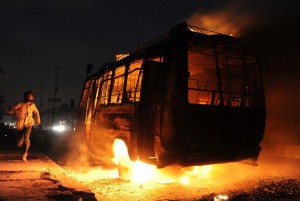 The recently released JIT (Joint Investigation Report) report of the Baldia factory fire in Karachi has once again reveled the sad reality of this once known and cherished ‘city of lights’: it is burning and dying. Karachi may have witnessed worse spates of violence in the past, but the present crumbling of state authority is unprecedented. The mayhem in the country`s financial capital and economic jugular in many respects has come to resemble the lawlessness of the tribal areas.
The recently released JIT (Joint Investigation Report) report of the Baldia factory fire in Karachi has once again reveled the sad reality of this once known and cherished ‘city of lights’: it is burning and dying. Karachi may have witnessed worse spates of violence in the past, but the present crumbling of state authority is unprecedented. The mayhem in the country`s financial capital and economic jugular in many respects has come to resemble the lawlessness of the tribal areas.
Armed gangs reign with impunity, holding hostage the city of 18 million people. More than 7,000 people are estimated to have been killed in violence since 2008 as political parties, sectarian outfits and ‘crime mafias’ battle for domination. But even this high casualty figure does not fully reflect the magnitude of the disorder gripping the metropolis. The near collapse of law-enforcement and governance has turned Karachi into a virtually lawless territory with the population living in a perpetual state of fear.
Patronised by ruling political parties and sectarian groups, scores of criminal gangs vie for control over land and the city`s other resources. Mafias have moved in, filling the vacuum left by a failing state. Extortion and kidnapping for ransom have become a highly lucrative business. Businessmen are forced to pay protection money for their survival. Factories are closing down as investors move to other areas. Awash with sophisticated firearms the city is sitting on a powder keg ready to explode with drastic consequences for the country`s economic and political stability.
What is most frightening is the prospect of the city becoming the new battleground for the Taliban and other militant groups. With the presence of thousands of fugitives, the city has become, perhaps, the biggest sanctuary for militants. They find little difficulty in blending into large immigrant populations from the northwest. Hundreds of radical madressahs across the city not only provide them with shelter and logistical support but also a constant supply of recruits for militant activities.
The militants have hugely benefited from the criminalisation of politics and ethnic tension. High-profile terrorist attacks on military and other security installations, including the Mehran naval airbase raid and the car bombing of a CID detention centre in recent years, have demonstrated the growing strength of militants in the city.
Not surprisingly, some security officials compare the Karachi situation with North Waziristan, the tribal agency which is described as the centre of gravity for militants and terrorism. Today, the situation in Karachi is far more complex and volatile than what existed in the 1980s and 1990s when thousands perished in ethnic and political violence.
For sure some of the problems of Karachi are rooted in its fast-changing demographic profile. According to some estimates, close to a million people are added to its population each year, making Karachi the fastest-growing city in the world. The massive influx of immigrants from the northwest in recent years has significantly changed the ethnic balance in the city reinforcing parochial politics.
The tug of war between the ANP and MQM is a manifestation of the city`s new demographic reality and ensuing political dynamics. It is a battle for control of Pakistan`s biggest city. The power struggle has taken a violent turn owing to their alleged patronage of criminal elements involved in land grabbing, arms smuggling and extortion.
What has made the situation more dangerous is the inability of the government to crack down on the perpetrators, many of whom are said to come from within the ranks of the coalition partners. Similarly, the politicisation of law-enforcement agencies has compromised their professionalism, rendering them pliant and ineffective.
At least 40 per cent of the Karachi police force has reportedly been recruited on political grounds rather than on merit. The politicisation of police has become more pronounced after the Sindh government repealed the Police Order of 2002, giving powers of transfer and appointment of senior officers to the provincial government.
Now it has become much easier for the ruling parties to get police officers of their choice posted in their constituencies to protect their illegal activities.
Almost all of them were brutally murdered. Among all such chaos, there appears to be no simple solution to the boiling Karachi cauldron. But the country`s economic lifeline cannot be left to bleed.
It requires emergency political and security measures to end the ongoing violence. Peace can only be restored by depoliticisation of the police and other security agencies. It is mainly the responsibility of the ruling political parties to come to some agreement to save the city. An unstable Karachi will destabilise the entire country.
PD
Baldia factory fire in Karachi




















